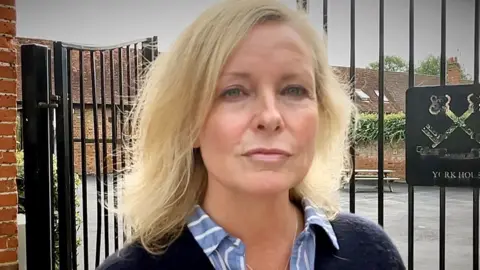ARTICLE AD BOX

 BBC
BBC
Elaine Fraser recognised the symptoms of anaphylactic shock thanks to training by the school where she works
When teacher Elaine Fraser collapsed at home after drinking a ginger beer, she had no idea she had an allergy.
“It escalated unbelievably quickly,” Elaine recalls. “My chest was concave trying to pull in breath.”
The 53-year-old began to recognise the symptoms of anaphylactic shock, as staff at her school had been trained to spot them and to use an adrenalin pen in emergencies.
“I knew that my time was running out, and it was a cold, clear realisation that I needed to make one very good call,” Elaine says.
The call she made was to the school caretaker, Jason Jaekel, who lives just two minutes from her home.
“You could tell from how she sounded it was a life-threatening situation,” remembers Jason. “My first thought was to grab the [adrenaline pen] kit from the school office and just get round as quick as I could.”
Jason dashed to Elaine’s house and administered the EpiPen as he’d been taught at York House School in Hampstead.
“It was just a lightbulb moment,” he says. “The pen went in, and I saw the light come back into her eyes. Her breathing steadied off, her eyes came back, she started to talk. I just felt an immediate relief.”
Elaine's life was saved because of a change to the law in 2017 which allowed schools in the UK to stock and administer adrenaline pens.
It followed the death of 13-year-old Karanbir Cheema, who died after another student flicked a piece of cheese at him, triggering his dairy allergy. His own EpiPen was out of date - and didn’t work when it was administered.
But the school EpiPen scheme is optional and unfunded, and it is estimated that only half of schools have signed up.
Some MPs have called for the scheme to be mandatory and many campaigners and medics want it to be extended beyond schools, perhaps to restaurants and other public places.

 Family photo
Family photo
Karanbir Cheema died after his out-of-date EpiPen failed to work
The adrenaline pen which saved Elaine’s life was supplied by Zak Marks’s firm Kitt Medical, which supplies adrenaline to around 500 schools.
He told us that since launching in 2023, the company’s pens have been used seven times to treat life-threatening allergic reactions. Zak says he cries every time he is told this has happened. And his company’s ambition goes well beyond schools.
“Our goal is to be every defibrillator’s next-door neighbour,” says Zak. “We want adrenaline pens and training in every public place.”
Nasar Ahmed died in 2016 after an allergic reaction to his school dinner. At the 14-year-old's inquest, his paediatrician and the coroner asked if adrenaline could be available in public places, in much the same way as defibrillators.
The Chief Medical Officer wrote to the coroner to say there were serious clinical and practical concerns about adrenaline pens being administered by an untrained member of the public in the same way as defibrillators.

 Family photo
Family photo
Nasar Ahmed died of an allergic reaction in 2016
The Medicines and Healthcare Products Regulatory Agency told the BBC this could only happen with another change in the law. Similar legislation is in place in Ireland which crucially allows only trained individuals to administer adrenaline in an emergency.
Nasar’s paediatrician, Dr Chinedu Nwokoro, acknowledges there are obstacles to bringing EpiPens to more locations.
“Unlike a defibrillator, this is a medicine,” Dr Nwokoro says. “It's something that can expire, and there's a question around who carries responsibility for replacing it and who pays for it.”
But he still believes a change in law should happen.
“What we're seeing is a continued trickle of deaths - or serious near misses - from anaphylaxis that might be mitigated by this kind of change in legislation and policy,” he says. “If it’s has been rolled out safely in schools, why not elsewhere?”
The law changed in exactly this way in Ireland following the death of 14-year-old Emma Sloan. She had a reaction to a Chinese meal and died in the street after a pharmacist said he was unable to give her a life-saving adrenalin pen without her prescription.

 Family photo
Family photo
Emma Sloan's death prompted a change in the law in Ireland
Under current law, Irish pharmacies and other organisation or business can hold and administer the drug if they have the right training and manage the medicine appropriately. So far, only a small number of organisations have signed up, including a group of beekeepers, an electrical firm, a community football club, and several community centres and colleges.
James Kelleher from Cork Beekeepers told the BBC he signed up to protect visitors who may have an adverse reaction to a bee sting. Asked why so few organisations had followed suit, he said he thought people simply did not know about the scheme.
The UK has one of the highest prevalences of allergy in the world and an outline for the UK’s very first national strategy for allergy is currently being considered by medics and advocates from the National Allergy Strategy group.
They will publish the strategy in October 2025 in the hope of shaping public policy in this area.
Professor Adam Fox, chairman of the National Strategy for Allergy, told the BBC that the prevalence of food allergies was rising, leading to an increase in the number of severe reactions.
“After the home, the most common place for reactions is schools, followed by restaurants,” Prof Fox explains, adding that policy makers needed to consider whether better access to adrenaline pens could help keep allergy sufferers safe.
Doctors still haven't been able to work out which ingredient in the ginger beer triggered Elaine’s allergic reaction. But Prof Fox says while it is possible to discover an allergy later in life - or to develop one - it is “uncommon and not something to be unduly worried about”.
A Department of Health and Social Care spokesperson told the BBC it is working closely with “the NHS, voluntary organisations and patient representative groups to consider how allergy care and support could be improved”.

 7 months ago
41
7 months ago
41








 English (US) ·
English (US) ·